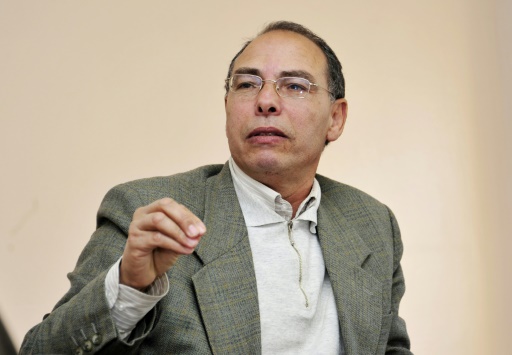
[ad_1]
Moroccan historian and human rights activist Maati Monjib, who was on hunger strike for 19 days, was provisionally released from prison Tuesday after three months in detention.
Friends and supporters greeted the 60-year-old academic, who looked visibly tired but happy as he emerged from El Arjat prison near Rabat, where he had been held since his arrest.
“The charges against me are fabricated … now that I have been granted bail, I will campaign for the freedom of the other detainees” held up for their opinions, he said shortly after his release.
Monjib’s lawyer, Mohamed Messaoudi, told AFP on Tuesday that “the investigating judge had decided to release him provisionally”.
Monjib, known for his open criticism of the authorities, was taken into custody on December 29 as part of a preliminary money laundering investigation.
At the same time, a Moroccan court sentenced him in January to one year in prison for fraud and endangering state security, as part of a trial that opened in 2015.
Her defense team said they had not been informed of the hearing and that Monjib was apparently not present.
He has repeatedly denounced his “wrongful arrest” and denied the charges against him.
Moroccan authorities said Monjib had received a fair trial.
His supporters in Morocco and abroad have repeatedly called for his release, calling him a “prisoner of conscience” and worrying about the health effects of his hunger strike.
In a Facebook statement in November saying he had contracted the novel coronavirus, Monjib said he also suffered from heart problems and diabetes.
His lawyer said on Tuesday he was “in a good mood”.
‘Dubious charge’
The charges against Monjib relate to running a center he created to help promote investigative journalism.
Six journalists and activists also on trial were sentenced to up to one year in prison. Three left Morocco and obtained political asylum in Europe.
Human Rights Watch said it was “relieved” by the release of Monjib.
His conviction “should be overturned because authorities failed to notify him of the final session of the trial, which took place in his absence,” the New York-based watchdog said in a statement.
He said that “the criminal investigation into the dubious charge of ‘money laundering’ against him is ongoing” and urged the authorities to “respect his right to a fair trial by ending their refusal to grant him full access to their own file “.
Monjib’s support committee said it asked for transfer to hospital on Monday to “continue the hunger strike under medical supervision.”
He had become considerably weaker and passed out on several occasions, his supporters said.
Monjib began his hunger strike on March 4 to demand his immediate release.
Earlier this month, Monjib, who is also of French nationality, filed a complaint in France, including for “psychological harassment” linked to his detention.
His French lawyers asserted at the time that he was “one of the most emblematic critical voices of the Moroccan regime, denouncing in particular the hold of the security services on political life”, and describing the legal proceedings as “clearly political “.
His wife Christiane Darde last week called on French President Emmanuel Macron to “intervene quickly”, saying Monjib’s health was in danger.
The media watchdog Reporters Without Borders (RSF) also welcomed the release of Monjib, which it said came as his health entered “a dangerous phase”.
RSF Secretary General Christophe Deloire called on Morocco to “drop all unfair proceedings” against journalists.
RSF ranks Morocco 133rd out of 180 countries in its Global Press Freedom Index for 2020.
Source link